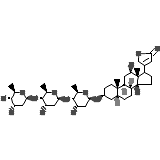Cardoxin




Cardoxin Brand names, Cardoxin Analogs
Cardoxin Brand Names Mixture
- No information avaliable
Cardoxin Chemical_Formula
C41H64O14
Cardoxin RX_link
http://www.rxlist.com/cgi/generic/dig.htm
Cardoxin fda sheet
Cardoxin msds (material safety sheet)
Cardoxin Synthesis Reference
S. Smith, J. Chem. Soc. 1930, 508
Cardoxin Molecular Weight
780.938 g/mol
Cardoxin Melting Point
248-250 oC
Cardoxin H2O Solubility
Insoluble
Cardoxin State
Solid
Cardoxin LogP
1.969
Cardoxin Dosage Forms
Tablet; Capsule; Injection
Cardoxin Indication
For the treatment and management of congestive cardiac insufficiency, arrhythmias and heart failure.
Cardoxin Pharmacology
Digoxin, a cardiac glycoside similar to digitoxin, is used to treat congestive heart failure and supraventricular arrhythmias due to reentry mechanisms, and to control ventricular rate in the treatment of chronic atrial fibrillation.
Cardoxin Absorption
Absorption of digoxin from the elixir pediatric formulation has been demonstrated to be 70% to 85% complete (90% to 100% from the capsules, and 60% to 80% for tablets).
Cardoxin side effects and Toxicity
Toxicity includes ventricular tachycardia or ventricular fibrillation, or progressive bradyarrhythmias, or heart block. LD50 = 7.8 mg/kg (orally in mice).
Cardoxin Patient Information
Digoxin is used for the treatment of congestive heart failure and for irregular heartbeat. Notify your physician if you are pregnant or nursing. Do not stop taking digoxin without talking with your physician. Digoxin may be taken with or without food. It should be taken at approximately the same time each morning. Do not take over-the-counter antacids, cough, cold, allergy or diet medications without notifying your physician and pharmacist. Notify your physician if you develop an irregular heartbeat, trouble breathing, skin rash, nausea, diarrhea, blurred or yellow vision, or unusual weakness or tiredness.
Cardoxin Organisms Affected
Humans and other mammals














